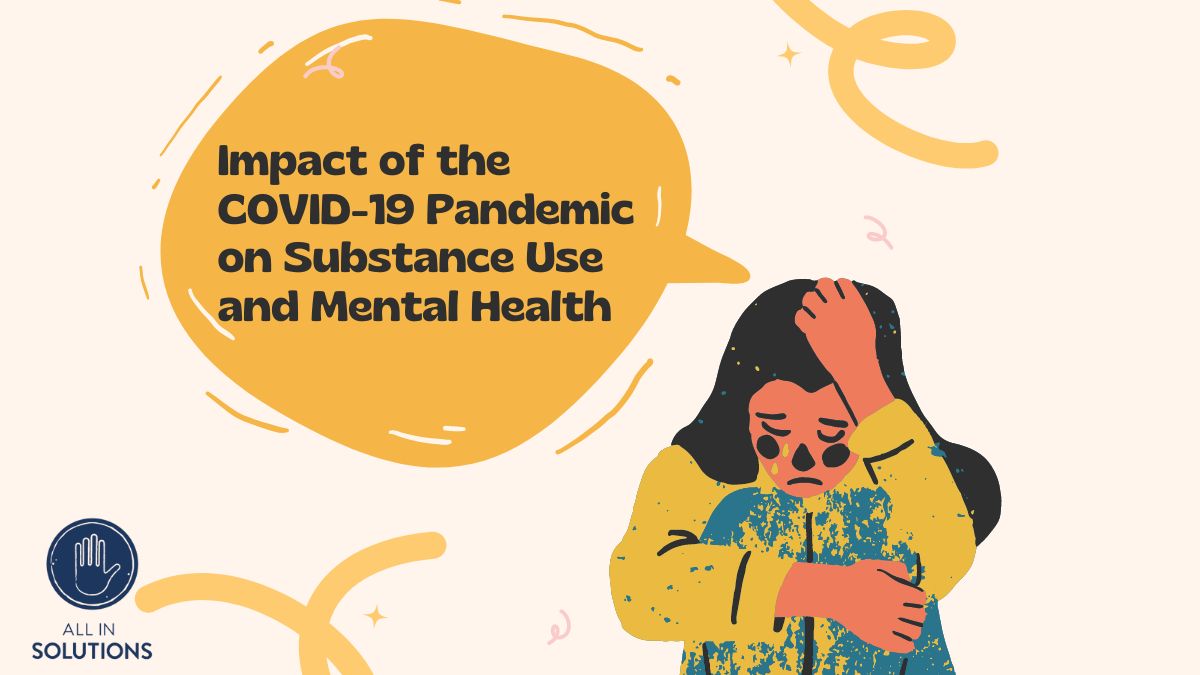The COVID-19 pandemic will have negative effects on substance use and mental well-being around the globe. It is predicted that there will be an increase in anxiety, depression and substance use disorder (SUD), diagnosis. Fear of contagion and job loss, as well as the stress from having a loved one with the virus have all contributed to an increase in stress. Being severely ill or working in a health care setting can cause trauma. The virus may also have adverse neuropsychiatric consequences that could lead to a worsening mood and cognitive function. These adverse effects are compounded by the lack of access to treatment and isolation that mitigation measures have taken to lessen virus spread, such as quarantining and stay-at-home orders and travel bans.
What we know so far about the negative effects of the Pandemic
Overdose of Opioid
The number of emergency department visits and the rates for opioid overdoses and suicide attempts was significantly higher in a large study that was conducted in multiple emergency rooms. This could be due to increased drug use, solitary or more risky use, and reduced access to naloxone or other treatment _. Another study found increases in overdose rates. One showed an increase of 11% (fatal), and 18% (nonfatal) in overdose deaths between January 2020 and April 2020. The other indicated that there was a 17% rise in emergency medical service opioid overdose runs that included transportation to an ED, 71% more runs that were refused transportation, and 50% more runs for suspected opioid overdoses that resulted in death at the scene of the pandemic.
Alcohol use
Alcohol sales, severity measures and self-reports show that alcohol consumption has increased in many countries during the pandemic. Anxiety and depression are all factors that contribute to an increase in alcohol consumption during the pandemic. These factors, along with others, are well-known to increase the likelihood of alcohol-related problems.
Other addictions and substance abuse
In addition to increased cannabis use and other substance use, gambling and internet addiction behavior were also reported during the pandemic.
Mental health
In April 2020, nearly 1 in 7 Americans reported psychological distress during peak stay-at-home orders. This compares with 1 in 25 in April 2018. Between April and June 2020, 12% and 29% more people reported a new diagnosis of generalized anxious disorder and depression, respectively, compared with recalls of one month prior to the outbreak. In addition, premorbid mental health diagnoses showed a greater prevalence of anxiety and depression in these individuals than in pre-outbreak measures. In the discussion about opioid overdose risk, we also saw an increase in ED visits and suicide attempts. The following factors are associated with mental health problems during the pandemic: female sex; younger age; lower income; poorer coping skills; multiple psychiatric complications, prior trauma exposure; deteriorating physical and emotional health; lower exercise.
COVID-19 and substance abuse
The homeless and incarcerated are more likely to have substance use disorders (SUD). This is because they are more susceptible to disease transmission due to their insecurity and poor living conditions. More than half of U.S. prison inmates have SUD.
The increased mortality and serious infections from COVID-19 is evident in pathophysiological data for people with Substance Use Disorders. There is also an underlying protective role for nicotine use. Data from the population show better outcomes for active smokers than for those who quit, but it is not clear. There are also higher rates of COVID hospitalizations with CUD (1.78 OR and AUD 95.68) 22.
Treatment effects
Initially, access to care for substance abuse disorders and mental health was reduced during the pandemic. This contributed to higher rates of opioid withdrawal as well as overdose. But the use of telehealth and other technology is expanding and governmental regulations regarding prescribing of medication assisted treatment for opioid use disorder such as buprenorphine were relaxed early on, resulting in an increase in access to care later on in the pandemic. It is known that group work and the development of relationships with other recovering individuals are important parts of recovery from psychiatric or substance use disorders. However, it is not clear if the current care, which is often remote, will continue to be as effective.
All In Solutions Counseling Center is a network of addiction treatment providers. We provide inpatient & outpatient substance abuse treatment programs that are tailored to meet each client’s needs. Our specialized programs include:
- Faith-based rehab
- Medication assisted opiate treatment
- Art therapy treatment
- Men’s drug & alcohol rehab
- Female-only addiction treatment
Our locations include:
Did you miss our previous article…
https://www.allinsolutions.com/what-happens-when-you-mix-weed-and-antidepressants/





